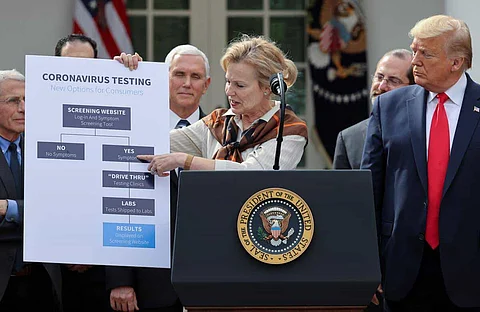
- Insights
- Cryptocurrencies
- Stocks
- White Papers
- Industry
- Geography
- Insights
- Cryptocurrencies
- Stocks
- White Papers
- Industry
- Geography


The outbreak of coronavirus has taken many countries under its hood. Most of them are suffering from economic loss and a higher mortality rate. Amid this, governments are in a great dilemma – how to handle the circumstances around the falling economy and upsurging coronavirus infections. In order to get better hold onto situations across their countries, they are moving towards innovative technology adoption. Out of all the new-age technologies, big data and data analytics can serve with a great opportunity, where governments across various nations can understand the outbreak analytics.
In South Korea, where initially the infections spun out of control, the government has been able to slow down the pandemic by using aggressive tracking tools.
For example, the government has released a smartphone app that can track self-quarantine subjects to ensure that they do not leave their homes and maintain strict separation from other people, including family members. Those under quarantine can use the app to report their symptoms, and provide status updates to officials.
Similarly, Israel is using mobile phone data to track the movements of those who have tested positive for the virus and to identify those who need to be quarantined.
Moreover, across Bangladesh, the government has initiated a process to draw a digital map to track coronavirus cases and find out areas susceptible to contamination by using mobile users' information — a move that may help portray the real picture of a possible outbreak. Under a self-reporting method, mobile users will get a short message (SMS) from their operators and in reply, they will share some of their health information.
All the 16.62 crore mobile phone users in the country will start getting SMS from this morning and they will be asked to make a call to *3332# free of charge. During the 90-second call in the form of interactive voice response (IVR), users will reply to five questions about their age; whether they have breathing problems; if they have fever or cough; whether they have come in contact with someone who returned from abroad recently; and if they have come close to any coronavirus-infected people.
Furthermore, one of the countries that have efficiently harnessed big data analytics to contain the spread of the Coronavirus pandemic is Taiwan. The country reported only about 50 odd cases by mid-March, while its neighbor (South Korea) had clocked close to 8000 cases.
Taiwanese officials have conducted a detailed mapping of people who were infected and from whom they caught the infection. They integrated the Taiwan National Health Insurance databases with immigration and customs databases.
Using all of this data, the Taiwanese Government could trace the 14-days travel histories and symptoms of its citizens. Further, international travelers were asked to scan a QR code. This redirected them to an online health declaration, which was used to provide contact information and symptoms.
The US government is in active talks with Facebook, Google and a wide array of tech companies and health experts about how they can use location data gleaned from Americans' phones to combat the novel coronavirus, including tracking whether people are keeping one another at safe distances to stem the outbreak.
Public-health experts are interested in the possibility that private-sector companies could compile the data in anonymous, aggregated form, which they could then use to map the spread of the infection, according to three people familiar with the effort, who spoke on the condition of anonymity because the project is in its early stages.
